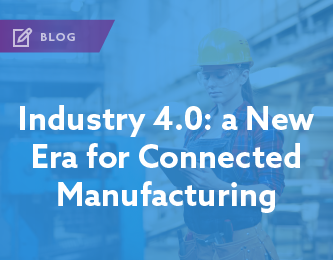The Fourth Industrial Revolution, or Industry 4.0, is well underway. It’s fundamentally different from its predecessors. The first, second, and third industrial revolutions were characterized by a technological breakthrough—the steam engine, the electrical grid, or IT automation. Industry 4.0 is shaped by what advanced technologies make possible: dramatic new opportunities in communication and connectivity. Industry 4.0 technologies such as artificial intelligence (AI), analytics, the cloud, the Internet of Things, machine learning, robotics, mobile, have the potential to connect billions of people to each other, to smart machines, and to unimaginable amounts of data.
The Dream vs. Reality
We see manufacturers embracing these Industry 4.0 technologies to digitally transform their operations, improve customer engagement, and secure competitive advantage. But for manufacturers to realize these benefits, they face challenges unique to this sector.
For starters, it’s harder for manufacturers to make sweeping changes. Given the nature of the industry, manufacturers make significant investments in physical plants and factories that they want to maximize. They’ve also made significant investments to streamline manufacturing operations by integrating the existing systems that drive their business (e.g., ERP, MES, PLM, CRM), and establishing EDI-based connections with outside suppliers and partners. These systems aren’t going away any time soon.
To stay competitive in the digital era, many manufacturers are modernizing IT and moving to the cloud, introducing hybrid landscapes that are more complex to manage. Clearly, the move from a traditional, linear supply chain to a modern, multi-tier digital supply network is not trivial; only 28% of companies have begun these implementations.
The Power of APIs for Digital Transformation
API-led integration can be a huge leap forward for digital transformation initiatives in manufacturing. APIs act as intermediaries between on-premise systems, cloud applications, and other data sources. APIs enable systems to connect and share information with each other in a plug-and-play way, and eliminate the need for custom point-to-point integrations between systems that are time consuming to build and maintain.
Jitterbit’s API Integration Platform is being used by some of the world’s largest manufacturers to connect manufacturing and supply chain systems with thousands of other applications and data sources.
- Bayer, one of the world’s largest pharmaceutical companies, uses Jitterbit to quickly and easily integrate data from Salesforce in the cloud with on premise Oracle and SAP ERP data to give their sales team complete visibility into order status.
- Matouk, a luxury linen company moved their entire operational systems to the cloud, and uses Jitterbit to integrate with their EDI trading partner, and on premise accounting system.
API integration can connect your data and applications simply, quickly and cost effectively. In fact, 90% of Jitterbit customers obtain an ROI in less than 12 months, and 60% of customers implement Jitterbit in less than 2 weeks.
Join us for a webinar to learn how you can unlock the power of your data and connect your manufacturing processes across the entire value chain.



